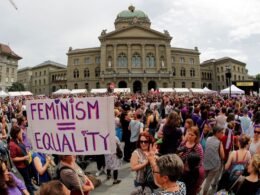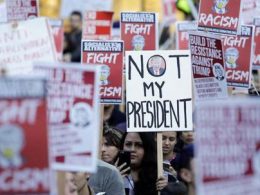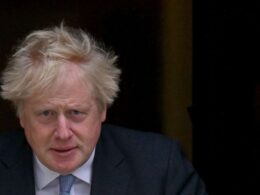Tottenham is located in the borough of Haringey, north London, where over 10,000 people claim jobseeker’s allowance. One ward, Northumberland Park, is among the most deprived areas in Europe.
The council has voted to add to this immiseration with £41 million in cuts to vital public services and jobs. Tottenham is also where the 1985 Broadwater Farm riots took place, sparked by the death of Cynthia Jarrett, linked to the police.
And now Tottenham is burning again. Adding to the deprivation suffered in the borough is the destruction of homes, services and shops that resulted from the rioting of 6-7 August.
But, contrary to reports from some politicians and media, the rioting and looting that took place was not just the result of ’outsiders’ or ’hooligans’ but was a spontaneous outpouring of the anger of sections of the local population, particularly young people.
Contrary to the media reports these were not ’race riots’, but involved young people from every ethnic background. Following the fatal shooting on 4 August of a 29-year old man, Mark Duggan, by police, a peaceful demonstration from Broadwater Farm, Mark’s home, demanding “justice” and explanation about his death was ignored.
Anger spilled over into rioting, which left parts of the area looking “like a battlefield”. Without fundamental change, the conditions for further rioting exist.
’Just the tip of the tip of the iceberg’
Youth who gathered to survey the debris on Sunday 7 August, said that the rioting that took place in Tottenham the night before only gave the merest glimpse of the seething anger and frustration bubbling up in the area.
Causes of this anger include acute unemployment, with 54 jobseekers for every vacancy in Haringey. As recently as 31 July the Guardian website posted a video where young people warned that the closure of eight out of 13 youth clubs would lead to riots.
“There’s nothing here for us”. Young people’s services are being hit hard as part of Haringey Labour-led council’s plans for £41 million of cuts over three years.
One 18-year old man told the London Evening Standard: “You get no opportunities around here. The police stop you because you’re black.
“They stop you because you’re wearing a hood”. Police racism is an accepted fact.
One young worker said that being stopped while driving was almost a daily occurrence.
Shocking as the scenes and footage of Tottenham have been, it was not unexpected. Over recent years, as young people have faced growing attacks on their right to a future, riots have ripped through France and Greece and other European countries.
Many, including the Socialist Party, warned that if brutal cuts were brought down on the heads of young people in Britain, riots could happen here. In April 2010, even Nick Clegg, then of ’Cleggmania’, now Lib Dem deputy prime minister in the coalition government, warned that a Tory government would create “Greek style unrest”.
36% of children in Haringey grow up in families struggling to meet the basic necessities of life. And the policies of the Tory/Liberal government are making things worse.
The end of EMA student payments was widely cited by young people in Tottenham as contributing to the growing frustration.
Country-wide conditions
These conditions, while severe, are not unique to Tottenham. Far from it – cuts in public services and jobs are ravaging communities across the country.
Within hours, the rioting and looting spread to other areas of London. Stella Creasy, Labour MP for nearby Walthamstow, tweeted on Sunday evening (7 August) that there would not be rioting in her constituency.
Within hours hundreds of young people were gathered on her local high street and in other parts of London.
Mark Duggan’s death in Tottenham is the latest of a number of shocking deaths at the hands of the police, mostly of young black men. But the highly combustible material was also the crippling poverty, frustrated ambitions and alienation of much of Tottenham’s inhabitants.
Stafford Scott, a community activist from Broadwater Farm, explained how the rioting started:
“The reason I believe that it happened is that police paid disregard to the feelings of the family of the young man … They haven’t met with any family liaison officers at all.
“We were absolutely disgusted by that, so we decided that we needed to come to Tottenham police station, because they may not be aware that a murder has been committed.”
Over a hundred people protested outside Tottenham police station on Saturday afternoon to demand justice. Stafford explained that the police prevaricated for hours, sending no one in a senior position to speak to the protesters.
People in Tottenham said that the rioting began after a 16-year old woman was beaten by the police. The shopping areas were the main target – and this has been the case in other areas too.
Petrol bombs were thrown. Shops were looted.
Mobile phones and sports clothing were taken – ’must-haves’ for young people, many of whom can’t afford such luxuries given poverty minimum wage rates and benefit levels.
But also taken were basic items such as food and nappies, an expression of the crushing poverty.
Distrust
Police claims that Mark Duggan was only shot after he opened fire on police are treated with contempt locally. There is no trust in the police, particularly following their lies about the deaths of Jean Charles de Menezes in 2005 and Ian Tomlinson last year as well as many other incidences, including the framing of Winston Silcott and the ’Tottenham Three’ during the Broadwater Farm riots of 1985.
Nor is there any confidence in the Independent Police Complaints Commission (IPCC) to carry out an independent investigation. In fact on Sunday evening the Guardian reported that “reliable sources” said that a bullet that lodged in a police radio, police ’evidence’ of Duggan’s firing, was a police issue bullet.
“The early suggestion from the IPCC was that the Met officers had returned fire after someone in the minicab opened fire.” The IPCC has so far refused to comment.
As the Socialist Party demanded after the death of Smiley Culture earlier this year, a genuinely independent inquiry is required, made up of elected representatives from the local trade unions, community organisations and especially the youth.
It should be allowed full access to all involved in the police operations that led to the death and take all the evidence it requires to reach a conclusion.
Widespread anger towards police
The vast majority of people do not condone the riots and condemn the burning of homes, post offices and council services. There is widespread anger that the police did not act effectively to defend people’s homes and local small businesses and shops.
Given how widely predicted rioting was, there was also anger that police were not prepared to protect local areas. Many blamed government cuts to police services.
Paul Deller from the Metropolitan Police Federation said: “Morale among the police officers dealing with this incident, and within the police service as a whole, is at its lowest level ever due to the constant attacks on them by the Home Secretary and the government in the form of the reviews into police pay and conditions.”
A trainee nursery assistant complained that only now, after the riots, when she and many others have lost friends to gun and knife crime over recent years, has there been so much interest in the area.
One young unemployed man who had attended the police station protest in Tottenham complained that media footage gave the impression that only black people had attended.
He said the reality was that young people from all sections of the community were represented and he feared the dangers of presenting the situation as ’race riots’.
Following the Murdoch scandal and years of criminalisation of young people the mainstream media is massively discredited in the eyes of young people. In the wake of rioting in other areas of London parts of the media appear to be playing up this false impression that there is a ’race’ element.
Organised, united campaign needed
Rioting, while an understandable reaction of rage to the conditions so many young people face, does not offer a way forward. On the contrary, the destruction of homes and services hugely exacerbates the problems working class people face.
The background to these events is the looting of public services and jobs by the Tory/Lib Dem government. Working class people face the biggest attacks on our living standards since the 1920s.
Given the theft of many young people’s futures and the failure of the student and trade union leaderships to provide a strategy for fighting back, it is not surprising that a minority have responded in this way.
But what is needed is an organised and united campaign to fight for jobs, homes and services. Back in September 2009, TUC general secretary Brendan Barber predicted that the government’s cuts would lead to riots.
Unfortunately he has made no serious attempt to provide young people with an alternative vehicle through which to express their anger and their aspirations.
The removal of EMA payments to 16-19 year old students and the tripling of university fees sparked student protests across the country in November and December 2010.
Disgracefully a strategy for the campaign was not supplied by the main student organisation, the National Union of Students. But that movement succeeded in smashing the widely promoted lie that cuts are necessary or inevitable.
Fundamentally the riots express the crisis and contradictions of capitalism – that profit-seeking big business is not prepared to invest in the education, training and employment of young people, in Tottenham, but also across Britain and the planet.
Capitalist politicians offer no solution; in fact the Tory/Liberal government policies seek to exact greater suffering from young people and the working class in order to shore up the banks and the capitalist system.
According to the Daily Mail the police officer in charge headed off on holiday not long after the shooting. Tory London mayor Boris Johnson has stated that he won’t return early from holiday to deal with the situation.
The prime minister and other government ministers are also relaxing in exclusive resorts in the US and Europe. Meanwhile London is burning.
So far there has been no government statement on the events. Johnson said that the damage to business was “the last thing that the London economy needs right now”.
Local Labour MP David Lammy condemned the riots as “totally unacceptable” but offered no alternative to the unacceptable conditions people suffer in his constituency, as in most of the country.
Nor has he challenged the enormous cuts being made by Haringey Labour council. The Socialist Party calls on Labour councils, elected in the hope that they would protect people against Tory cuts, not to wield the Con-Dem axe.
Instead they should set a ’needs budget’ based on funding the services required by the area and campaign to get the money from the government as the socialist-led Labour council did in Liverpool in the 1980s.
Broadwater Farm 1985
In October 1985 Cynthia Jarrett’s death sparked huge anger against the Metropolitan Police. Winston Silcott, Mark Braithwaite and Engin Raghip, the “Tottenham Three”, were wrongly convicted in March 1987 for the murder of PC Keith Blakelock during the Broadwater Farm riot.
All three convictions were quashed on 25 November 1991 after forensic tests suggested the men’s confessions had been fabricated. Youth Against Racism in Europe and supporters of Militant, the Socialist Party’s predecessor, played leading roles in the Winston Silcott Defence Campaign, demanding the release from a punitive sentence of this fighter against police racism and harassment.
There are many parallels with the situation in Tottenham in 1985 but also differences. In the 1980s Haringey was one of the Labour councils that initially pledged to not make Thatcher’s cuts but to fight for the funding of a needs budget as Liverpool did.
Today Haringey council is slashing its youth services budget by 75%. This contrast sums up the transformation of Labour into a party of big business that does not give a voice to the working class.
In a Guardian article about the threats to the borough’s youth services, Erika Lopez, 19, one of the organisers of Hype (Haringey Young People Empowered), a youth-led group that tackles gang and postcode violence through activities such as football tournaments held in neutral areas, said: “I’m upset but what can we really do about it? It’s not like we’ve got a chance to win in a fight against the government.”
While her dismay is understandable we have every chance to win against this weak and despised coalition government. A strong opposition could act on a number of issues such as the cuts, the Murdoch scandal, and so on, to push them out of power.
However Labour has no alternative to the cuts demanded by the bond markets. Local Labour MP David Lammy makes much of his ’local’ roots but in reality his has not been a typical Tottenham life, educated at a private school and elite Harvard university in the US.
More a typical MP’s life!
Standing against Lammy in the 2010 general election, the anti-cuts electoral alliance, the Trade Unionist and Socialist Coalition (TUSC), received over a thousand votes.
This reflects the anger at Blairite Lammy and gives a glimpse of the potential for a new workers’ party.
Organise against cuts
We need to build a mass, sustained and determined movement that can stop the Con-Dem onslaught. This means young people linking up with the powerful organisations of the working class.
A glimpse of the power of the working class was shown by the huge trade union demonstration on 26 March and the strike of three quarters of a million teaching and civil service workers on 30 June.
These events have given some idea of the strength that organised workers have.
But most young people in Britain today have never participated in a mass organised campaign that inflicted defeat on the government and improved the conditions of working class people.
However, many will have watched the revolutions in Egypt and Tunisia. And largescale movements have also taken place in Britain and will do again.
Around 20 years ago a democratic and organised campaign of mass non-payment of 18 million working class people defeated the hated poll tax and led to the downfall of Margaret Thatcher, the ’Iron Lady’.
A Haringey campaign against youth club closures showed the potential to organise locally. In an area where gun and knife crime has been organised across postcodes a call was put out that there would be no challenge to those crossing other areas in order to get to the campaign meetings.
Young people need to develop their own democratic and mass movement, including building anti-cuts unions in all the colleges, sixth forms and schools as well as the universities.
Communication via Facebook and Twitter etc must be supplemented with democratic debate at general assemblies and meetings on how to organise a movement and what such a movement demands.
But it is particularly important that young people link up with the trade union movement and the working class to build a movement powerful enough to stop the Con-Dem cuts and prevent the cycle of history in areas such as Tottenham.
On the basis of experience increasing numbers of young people will look to get organised in order to fight back around a socialist programme. This would start with the right to high quality training, and a job and/or college place for every school leaver.
It would also include the abolition of university tuition fees and the immediate introduction of a living grant.
The Socialist Party says:
- An independent trade union-led inquiry into the death of Mark Duggan. Scrap the IPCC. We need police accountability through democratic control by local people
- The council must immediately re-house those who lost their homes in the riots. For investment in social house building and renovation, creating jobs and improving health
- The council must immediately reverse the closure of local youth services and demand the funding from central government to pay for it
- No to all cuts in jobs and public services. Free education and training for all. We demand huge public investment in job creation and services
- Build a mass campaign to fight for these demands but also to fight for socialist change in the way society is run, with democratic planning of how we use the wealth and resources of society – under working class control and management, not that of the millionaires












